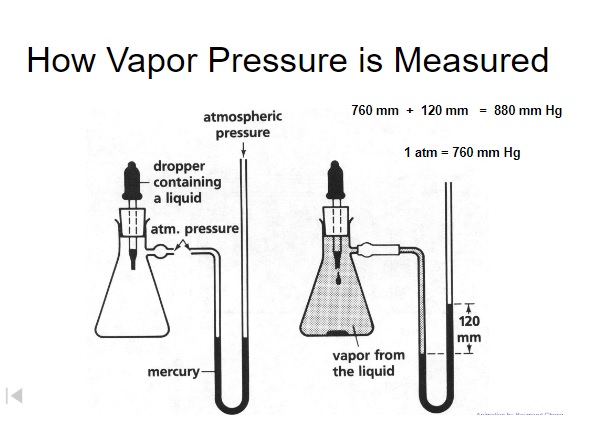The figure below shows how vapor pressure of a liquid is measured. Initially the flask is at atmospheric pressure. Then the liquid is dropped in the flask. Once equilibrium is reached, the pressure from the vapor created is recorded. My question is - if the flask were initially at a different pressure - let's say 5 atm - would the vapor pressure of the liquid be different? My thinking is that the additional pressure in the flask would keep more of the liquid molecules in liquid form. 
-
$\begingroup$ No, it doesn't. Unless it changes the substance. For example turns water into "hot ice". . $\endgroup$– MithoronCommented Oct 21, 2019 at 1:03
-
4$\begingroup$ Yes, it is,see en.wikipedia.org/wiki/Poynting_effect $\endgroup$– PoutnikCommented Oct 21, 2019 at 2:28
1 Answer
Yes, in principle it could be different, but the effect would be very small unless the increase in pressure were very large. To put it in simplified terms: The increase in ambient pressure compresses the liquid, bringing it to a higher-energy state, causing a higher proportion of the liquid molecules to want to escape from the liquid, and into the gas state, thus causing the vapor pressure to increase. This assumes ideal gas behavior, i.e., that the increased ambient pressure affects only the liquid, not the gas.
DETAILS:
Let's call your liquid "$X$". At equilibrium, the chemical potential of $X_{(l)}$ equals the chemical potential of $X_{(g)}$. The pressure of $X_{(g)}$ at which that occurs is called the vapor pressure.
Now suppose you increase the ambient pressure at constant temperature. Consider what happens to the chemical potential of the liquid: $d\mu = -S_mdT +V_m dP$, where $\mu$ is the chemical potential, and $S_m$ and $V_m$ are the molar entropy and volume, respectively. Thus, at constant $T$, $d\mu = V_m dP$. Hence the chemical potential of $X_{(l)}$ increases. This effect, by itself, would cause the vapor pressure to increase (to get the chemical potential of $X_{(g)}$ to match the increased chemical potential of $X_{(l)}$).
But what about the chemical potential of $X_{(g)}$? If the gas behaves ideally, then it is unaffected by the presence of other gases, and thus its chemical potential is unaffected as well. I.e., as with the liquid, its chemical potential is determined by its pressure. But unlike the case with the liquid, the pressure of $X_{(g)}$ is independent of the ambient pressure -- it depends only on the partial pressure of $X_{(g)}$ itself. Thus the only effect to consider would be the increased chemical potential of the liquid, and the vapor pressure would increase.
However #1: At high concentrations, gases tend not to behave ideally. Thus there are two possibilities: the increased partial pressure of the other gas increases the chemical potential of $X_{(g)}$, or decreases it. If it's the former, and the effect is sufficiently strong, the vapor pressure will decrease. If it's the latter, the vapor pressure will increase.
However #2: If the ambient gas is soluble in the liquid, increasing the ambient pressure will increase the concentration of the ambient gas in the liquid, which could reduce the chemical potential of the liquid, thus reducing the vapor pressure!
Again, let me emphasize that these are very small effects.
-
1$\begingroup$ That math makes sense to me, but does anyone have an intuitive explanation at a molecular level for why vapor pressure increases due to atmospheric pressure. $\endgroup$– RyanCommented Oct 31, 2019 at 17:32
-
$\begingroup$ @Ryan I've added some language towards the end, in the paragraph beginning "So, to put it in simplified terms..." Let me know if this helps. $\endgroup$– theoristCommented Nov 1, 2019 at 4:04
-
-
$\begingroup$ @Ryan: Feel free to accept my answer if you think it addresses your question. $\endgroup$– theoristCommented Nov 17, 2019 at 1:05
